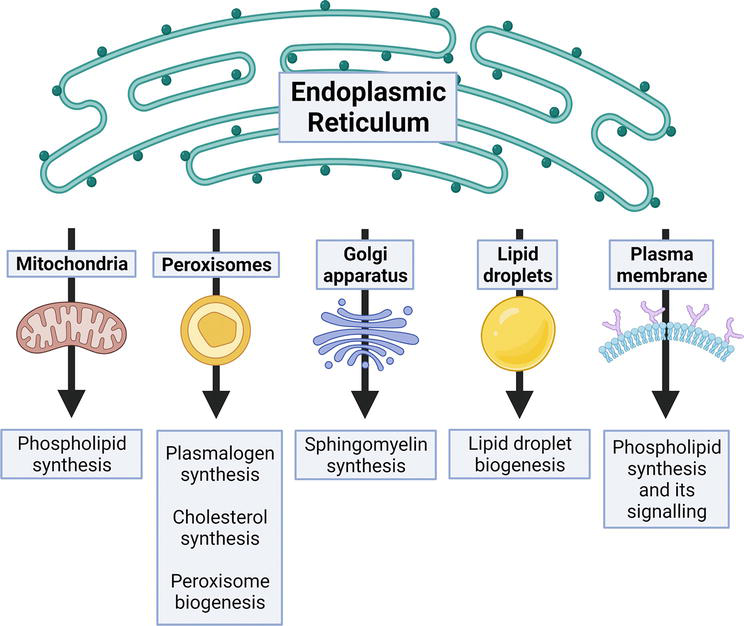Endoplasmic Reticulum Proteomics Services
Endoplasmic Reticulum Proteomics Services refers to a high-resolution mass spectrometry-based service combined with cell component separation techniques to systematically identify, quantify, and annotate proteins located in the endoplasmic reticulum (ER). This service covers ER membrane proteins, lumenal proteins, and their interacting protein complexes. It also reveals the expression profiles, post-translational modification states, and dynamic changes of key molecules involved in ER stress-related pathways.

Ventura R. Isabel Hernández-Alvarez M. Endoplasmic Reticulum: A Hub in Lipid Homeostasis. 2023.
ER is the largest membrane-bound organelle in eukaryotic cells, playing a key role in processes such as protein folding and processing, lipid metabolism, calcium ion storage, and maintaining cellular homeostasis. As a central hub in cellular stress response, ER dysfunction is closely linked to a variety of pathological conditions, including neurodegenerative diseases, diabetes, cancer, and inflammatory disorders. Studying the ER proteome can reveal its crucial role in cellular homeostasis, signal transduction, inter-organellar interactions, and disease mechanisms. With the development of high-resolution mass spectrometry and subcellular separation techniques, ER proteomics has become an essential tool for cellular function systems analysis and precision medicine research.
Leveraging advanced chromatography and mass spectrometry platforms, MtoZ Biolabs offers Endoplasmic Reticulum Proteomics Services to systematically analyze the composition, expression dynamics, and post-translational modifications of ER proteins. This service aids researchers in exploring key biological processes such as protein folding, transport, and ER stress. Additionally, MtoZ Biolabs can provide research on interactions between the ER and other cellular structures, such as the ER-plasma membrane interaction or the ER-Golgi complex interaction.
Analysis Workflow
The general workflow of Endoplasmic Reticulum Proteomics Services is as follows:
1. Sample Lysis and Organelle Separation
Use gentle lysis and centrifugation methods to isolate the ER components, ensuring the integrity of the organelle structure.
2. Endoplasmic Reticulum Enrichment and Purification
Apply differential centrifugation and density gradient centrifugation techniques to obtain high-purity ER fractions.
3. Protein Extraction and Quantification
Efficiently extract membrane-bound and lumenal proteins using specialized buffer systems, followed by concentration measurement.
4. Enzymatic Digestion and Peptide Preparation
Reduce and alkylate the proteins, followed by trypsin digestion to generate peptides suitable for mass spectrometry analysis.
5. Mass Spectrometry Detection and Data Collection
Use a high-resolution LC-MS/MS platform to collect peptide information.
6. Data Analysis
Identify protein composition and screen for differentially expressed proteins using database searches and quantification algorithms.
7. Bioinformatics Analysis
Perform functional analysis using GO/KEGG pathways, subcellular localization prediction, and protein interaction network mining.
Service Advantages
1. Advanced Analysis Platform: MtoZ Biolabs established an advanced Endoplasmic Reticulum Proteomics Services platform, guaranteeing reliable, fast, and highly accurate analysis service.
2. One-Time-Charge: Our pricing is transparent, no hidden fees or additional costs.
3. High-Data-Quality: Deep data coverage with strict data quality control. AI-powered bioinformatics platform integrates all Endoplasmic Reticulum Proteomics data, providing clients with a comprehensive data report.
4. High Purity ER Isolation: Utilize optimized differential and density gradient centrifugation protocols to ensure the purity and integrity of the target organelle components, effectively reducing background interference.
5. Comprehensive Quantification and Modification Analysis: Support multiple quantification strategies such as TMT and LFQ, and enable detection of various post-translational modifications, including ubiquitination, acetylation, and phosphorylation.
Sample Submission Suggestions
Sample Type: Supports samples from cells, tissues, primary cells, and other sources.
Storage and Transport: Samples should be rapidly frozen in liquid nitrogen immediately after processing and stored at -80°C to avoid repeated freeze-thaw cycles. Please use dry ice for transportation.
Additional Notes: Feel free to contact our technical support team before submitting samples for detailed and targeted sample preparation advice.
Applications
Application examples of Endoplasmic Reticulum Proteomics Services:
Endoplasmic Reticulum Stress and Signaling Pathway Research
Revealing the relationship between the unfolded protein response (UPR), calcium signaling, and cellular fate.
Protein Processing and Folding Mechanism Analysis
Systematically analyzing the roles of chaperones and foldases in the protein maturation process.
Membrane and Secretory Protein Function Research
Identifying membrane and secretory proteins localized to the endoplasmic reticulum or processed through it, and studying their functions and modifications.
Deliverables
1. Comprehensive Experimental Details
2. Materials, Instruments, and Methods
3. Total Ion Chromatogram & Quality Control Assessment (project-dependent)
4. Data Analysis, Preprocessing, and Estimation (project-dependent)
5. Bioinformatics Analysis
6. Raw Data Files
Related Services
Endoplasmic Reticulum Metabolomics Analysis Services
Endoplasmic Reticulum Isolation and ER Membrane Protein Purification Service
How to order?







